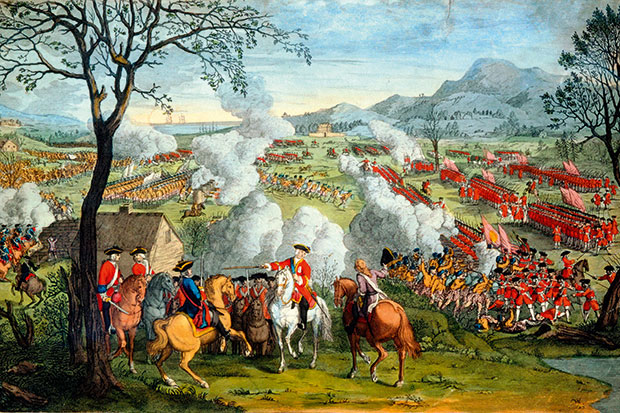What a wretched lot the Stuarts were, the later ones especially, the males at least. James II fled England without a fight in 1688, and the battlefield of the Boyne in 1690 earning him the unaffectionate nickname Séamus an Chaca, ‘James the Shit’. During the Jacobite rising of 1715 on the death of Anne and the accession of George I, his son Prince James Edward, coming late to the fight from France, fled Scone palace, telling his hapless supporters to ‘shift for themselves’ after the defeat at Sheriffmuir. In turn his son, Charles Edward, the Bonnie Prince, brought up in Rome, hurried from the field at Culloden in 1746, the culminating battle of the second major rising, the ‘Forty-five’, having mismanaged the whole affair. ‘There goes that Italian coward,’ spat Lord Elcho, one of his ADCs.
Only in the Scottish Highlands at that time, ‘one of the last feudal societies in 18th-century Europe’, could such a bloodline be thought worthy of the throne, let alone dying for. To admit otherwise would have been to undermine the very notion of feudalism, where blood was legitimacy. Paradoxically, Highland society had been under no danger from the House of Hanover, only where it threatened rebellion. Even its religion, chiefly, but by no means only, Catholicism — there were nonjuring Episcopalians (and south of the border the higher end of the Church of England) long after the death of King William, to whom they had found the oath of allegiance so repugnant — was largely tolerated. There was of course much resentment over the Act of Union, though Prince Charles Edward showed no marked enthusiasm for a return to the status quo ante; his sights were always set on London. He was never at home in the heather, contrary to the myths, the ballads and the pictures on shortbread biscuit tins.
His nemesis was a man the same age as he, 25, Prince William Augustus, Duke of Cumberland — clever, educated, soldierly and brave (if somewhat harsh even by the standards of the time). Not only had he seen action in the French wars, notably at Dettingen and Fontenoy, he had considerable experience of command, which meant he could take advice. His father, George II, called him back from Flanders and sent him north to deal once and for all with the ‘Highland army’, which had got as far south as Derby before deciding it was a forlorn venture and making back for Scotland. Cumberland coolly disengaged from the running fight, instead securing the east-coast ports through which the French had been able to supply the insurgents, and made Aberdeen his base for the winter, retraining his troops to deal with the feared ‘Highland charge’ — a reckless but nevertheless unnerving tactic that had discomfited some of the redcoat regiments. To what extent the device of lunging with the bayonet not at the man immediately to the front, who could parry with his buckler, but to the one adjacent — in essence the old trick of the Roman testudo — was actually employed is questionable, for in a melee instinct prevails; but the army that left Aberdeen for Inverness, the Jacobite base, in April (including several Scots Lowland regiments as well as loyal Highland scouts) did so confidently.
It was, however, the redcoats’ disciplined musketry that determined the battle on the 16th, not least their ability to keep their powder and flint dry in the ‘dreich’ weather of the Moray firth. That and Charles Edward’s lamentable choice of ground. Drummossie Moor, six miles east of Inverness, much of it bog, was no place to put one’s faith in a charge on foot by men who were tired out by a futile march the night before, had had nothing to eat worth the name for days, and whose only experienced military leaders were in open dispute with the prince over strategy. Even on a fine day (the battlefield is beautifully preserved and marked), it can beggar belief that even a novice could think to give battle there. And novice Charles Edward certainly was.
Trevor Royle is an accomplished military historian of the 17th and 18th centuries, and of the martial Scots generally, and describes the Forty-five with shrewdness and balance, though without the benefit of maps. His prose is lyrical but hardheaded, and the people-centred narrative is always engaging. He sets the Forty-five in its broader historical context, arguing that by affirming the Hanoverian succession, Culloden, and the people who fought there, shaped the whole political landscape of Europe and paved the way for the creation of the British empire. Even the SNP-leaning historian Tom Devine concedes that it underwrote the Scottish Enlightenment.
Whether or not a Jacobite victory at Culloden would have meant ultimate Hanoverian defeat is another matter; Unionism had hidden strengths, then as now. Though the fact that the Lowland regiments that fought on the government side in 1746 are now forced to wear the kilt is food for thought.






Comments